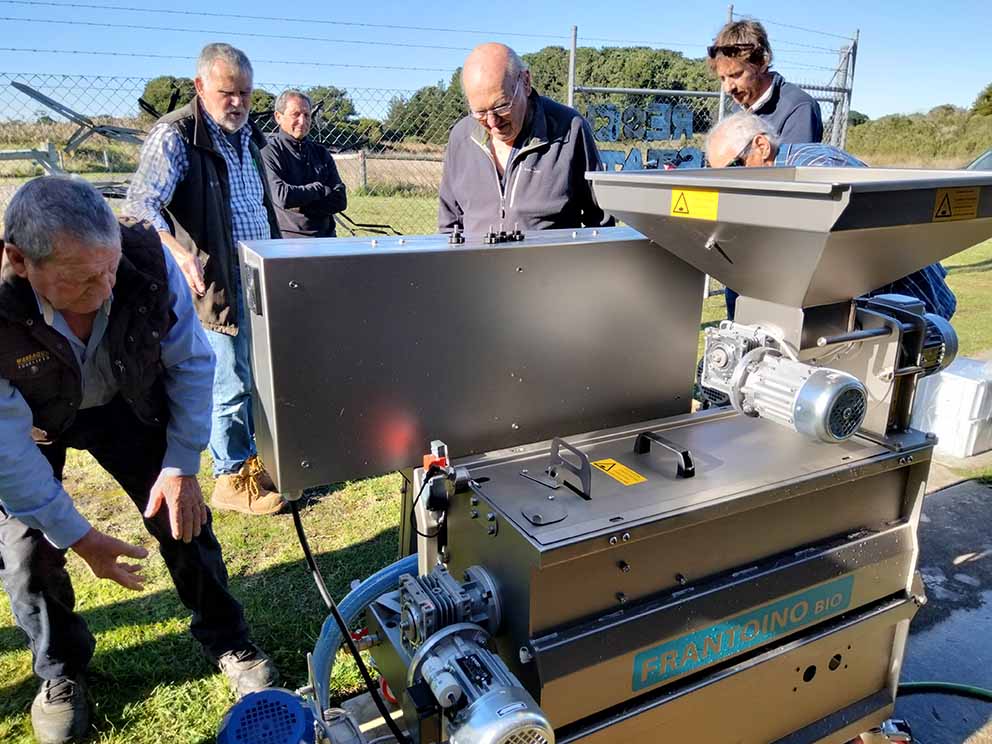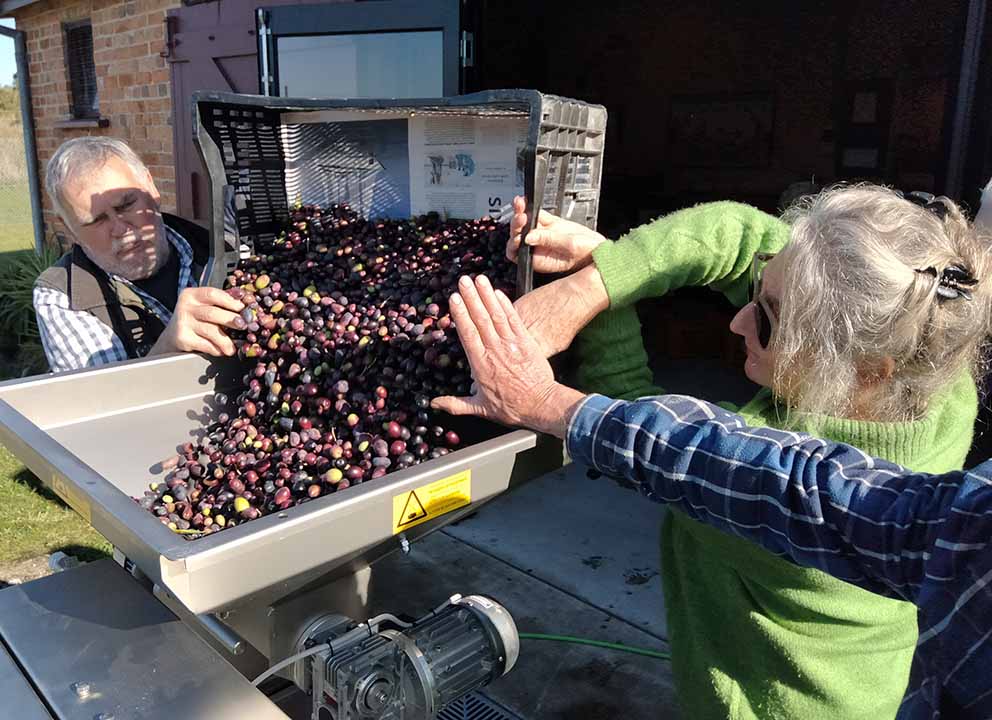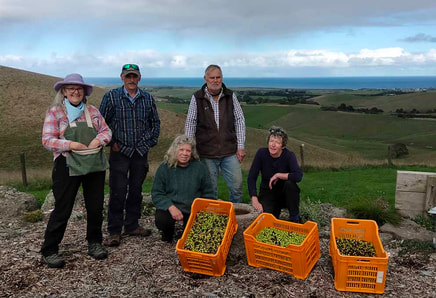 The olive pickers: Glenda, Ted, Liane, Matt and Catherine
The olive pickers: Glenda, Ted, Liane, Matt and Catherine By Catherine Watson
WELL here we are: the olive pickers. Five of us picked about 50kgs over a couple of hours in a neglected olive plantation at Sarah and Hayley’s place high in the Woolamai hills. Amazingly we scored a still, sunny day for picking.
Ted and Glenda picked faster than the rest of us (they once owned their own olive plantation) but kindly agreed to share the spoils with us beginners.
WELL here we are: the olive pickers. Five of us picked about 50kgs over a couple of hours in a neglected olive plantation at Sarah and Hayley’s place high in the Woolamai hills. Amazingly we scored a still, sunny day for picking.
Ted and Glenda picked faster than the rest of us (they once owned their own olive plantation) but kindly agreed to share the spoils with us beginners.
Our harvest was destined for the commissioning of the new community olive presser, down at the Rescue Station arts centre on the outskirts of Wonthaggi.
The big day is Saturday when the community will bring their bounty and return a few days later for their share of the olive oil.
Wonny Olives is the brainchild of Liane Arno and Matt Stone – the 600kg Italian-made beast of a presser is their gift to the community. They hope the olive picking and pressing will become an annual event.
Wisely, they decided to hold a trial pressing before the main event. So last Thursday a small team gathered at the rescue station for the first pressing and to learn first-hand from James, the expert, who came all the way from Tamworth to guide us through the olive oil pressing process.
The big day is Saturday when the community will bring their bounty and return a few days later for their share of the olive oil.
Wonny Olives is the brainchild of Liane Arno and Matt Stone – the 600kg Italian-made beast of a presser is their gift to the community. They hope the olive picking and pressing will become an annual event.
Wisely, they decided to hold a trial pressing before the main event. So last Thursday a small team gathered at the rescue station for the first pressing and to learn first-hand from James, the expert, who came all the way from Tamworth to guide us through the olive oil pressing process.
It hasn’t been the greatest year for olives locally – many trees produced no fruit at all – but Angela Christa had no such problem. She brought 75kgs of ripe fruit from her Corinella plantation. Her fruit was much riper than ours so it was pressed separately.
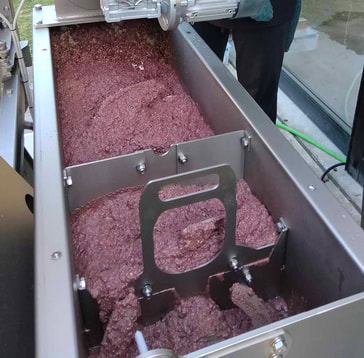
Extracting oil from olives is a slow process. It starts with the olives being tipped into a hopper, which leads to the crusher. From there the crushed olives go into a chamber where they are warmed and gently tumbled for at least half an hour to allow the tiny oil droplets to form larger droplets.
I think this when you are meant to stop for a bowl of spaghetti and a glass of grappa but we wisely stuck to coffee and a slice of Liane’s fig and apple cake.
I think this when you are meant to stop for a bowl of spaghetti and a glass of grappa but we wisely stuck to coffee and a slice of Liane’s fig and apple cake.
I lost track of the process after, trusting that wiser heads than mine were taking it all in. I know there was a spinner and a water inlet, and the two have to be finely balanced to extract the oil.
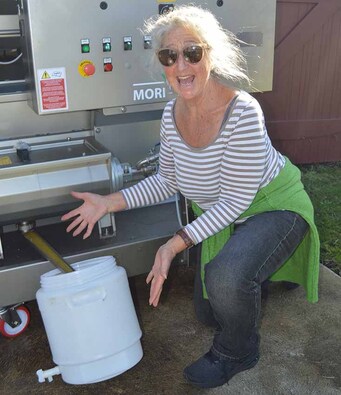
And finally … a couple hours after starting, the oil begins to trickle down the shute. The oil is a dark purple and Angela looks pretty chuffed.
When our fruit – a mix of green and purple from four properties - is processed that afternoon, the oil is quite different. It’s a surprisingly vibrant green as it comes out of the machine. It’s faded now to a more seemly olive green.
Our 50kgs of olives from Woolamai makes about 5 litres of oil. The pickers get to share the spoils with the owners of the olive trees. So 2.5 litres for us divided between five - approximately 500mls each. I’d hate to be paid by the litre for picking olives.
But OMG, what olive oil, smelling like freshly cut grass, and we have followed the process all the way through, from the picking to the tasting. We are bedazzled by our own earthiness.
On Saturday, the fruit will all be processed all together. Pressing starts at 9am and the team will press all day. The earlier you can get your fruit there the better so they can go for a continuous run.
If you are bringing fruit, please email Liane at [email protected], and let her know how much fruit you are bringing and approximately what time you expect to arrive.
As a rough guide, 10kgs of fruit makes about 1 litre of oil. Bring a container with you for your oil, with your name on it as you’ll need to pick up the oil later.
And if you can, also bring some containers to take away the waste product – the mush – which makes good mulch for the garden.
When our fruit – a mix of green and purple from four properties - is processed that afternoon, the oil is quite different. It’s a surprisingly vibrant green as it comes out of the machine. It’s faded now to a more seemly olive green.
Our 50kgs of olives from Woolamai makes about 5 litres of oil. The pickers get to share the spoils with the owners of the olive trees. So 2.5 litres for us divided between five - approximately 500mls each. I’d hate to be paid by the litre for picking olives.
But OMG, what olive oil, smelling like freshly cut grass, and we have followed the process all the way through, from the picking to the tasting. We are bedazzled by our own earthiness.
On Saturday, the fruit will all be processed all together. Pressing starts at 9am and the team will press all day. The earlier you can get your fruit there the better so they can go for a continuous run.
If you are bringing fruit, please email Liane at [email protected], and let her know how much fruit you are bringing and approximately what time you expect to arrive.
As a rough guide, 10kgs of fruit makes about 1 litre of oil. Bring a container with you for your oil, with your name on it as you’ll need to pick up the oil later.
And if you can, also bring some containers to take away the waste product – the mush – which makes good mulch for the garden.
